A quick scanning of events as they currently happen in the Middle East, should make us indeed, exceptionally afraid of what is in store for the entire region in the coming weeks and months. It is not going only to be more of the same, but signs indicate that more dangerous and uglier killings will continue unless a creative diplomatic initiative takes place soon. Now, sadly with what seems to be the unstoppable and increasing number of car bombs, diplomacy clearly seems to be slipping away from the hands of regional and international powers. The latest such incident that occured last Thursday, in the Hezbollah’s heartland of ‘Harat Hreik’ in Beirut’ss southern suburb (Addahyeh) is just another ugly testament of such horrors.
This is the fifth car bomb targeting areas under the control of Hezbollah mostly in South Beirut since July 9, in which tens of civilians have died and hundreds wounded. On December 4, a leading member of the Iranian-backed Hezbollah, Hassan Lakkis, was shot in Hadath district in the outskirts of Beirut. Also, and in major escalation of acts of violence was a double suicide bombing on November 19, 2013 outside the Iranian Embassy in Beirut, killing 22 and injuring more than 140 people including the Iranian cultural attaché. And in what seems to be a retaliatory act, a car bomb killed the former Lebanese finance minister and leading opposition figure Mohammad Chatah, in Central Beirut on December 27, 2013.
Earlier on August 23 last year, there were two blasts outside Sunni mosques in the Northern city of Tripoli, killing 40 people and injuring 400.
No matter who is behind this or that car bombing, the continuous bloody conflict in Syria dangerously threatens the entire region’s stability. And it has to be made absolutely clear that this conflict, contrary to what many politicians and writers say, is not a sectarian one despite the indirect involvement of the ideologically diverse neighbouring and regional countries. It is of a political and strategic nature par excellence. Hezbollah’s direct role in the conflict and the fact that its militia is fighting with, and greatly aiding Bashar Al Assad’s regime, is a political act rather than a religious one.
Hezbollah’s heavy involvement alongside Syrian forces comes as a result of its deep-rooted alliance with the Iranian regime. Iran’s strategic interest in the region is an open secret, not now but since the rise of Ayatollah Khomeini’s extremist Islamic Republic in February 1979, which the Gulf region at its roots. The late Ayatollah Khomeini had driven his country into an eight year long senseless war against Saddam Hussein’s Iraq for almost a decade in the 1980s. That war not only impoverished both countries, but also thehuman losses in Iran and Iraq ran into hundreds of thousands.
The Iran-Iraq war was a conflict aiming at regional hegemony, as is Syria’s current conflict where the regional powers- apart from Turkey- are indirectly involved. Turkey was actively and directly involved at the beginning of the uprising in the northern part of Syria, and openly played host for the various emerging Syrian opposition groups during 2011-2012. But Tayyep Erdogan’s government went through a phase of re-thinking and almost entirely withdrew from the intriguing Syrian web for many reasons, domestic and international. By mid-2013, and in view of western governments’ disappointing hesitance to intervene, Ankara decided to limit its Syrian activities to hosting more than half a million Syrian refugees in Turkey.
Unlike Iraq, the other killing field in the region but of a different political nature, is Lebanon given the fact that it is now in the midst of multiple conflicts- some local and other regional and even international- but all dangerously and intriguingly interconnected. Yes, of course Syria, being a vast country and known for its social mosaic and ethnic diversity, one could find sectarian elements in some pockets of the country, near and around the coastal and mountainous areas stretching from the Turkish to the Lebanese borders.
But most certainly, Syria’s war is not sectarian and it is unlikely to reach any stage similar to the clearly defined Bosnian war of 1990s. As in Bosnia, many analysts see no solution can be found in Syria without foreign intervention, whether diplomatically or militarily. Most major warring factions in the country (Lebanon included) are supported by, and coordinate their operation by their own sponsors from outside the country. The so-called Islamist Jihadists, which are being wrongly hyped up by media outlets and some western officials, are not so difficult to dismantle since they are mostly foreigners. Additionally, these Jihadist are mostly brought into the country after being paid a lot of cash, and others are planted by the regime’s vicious intelligent units to play this dirty game. It is no longer a secret that the Al Assad regime (and that is father and son) is a leading regional innovator in manufacturing terrorists. It is a well established fact that the regime has acquired this trade from Communist Romania and East Germany.
Lebanon has been suffering from this policy since the mid-1970s.
By Mustapha Karkouti








